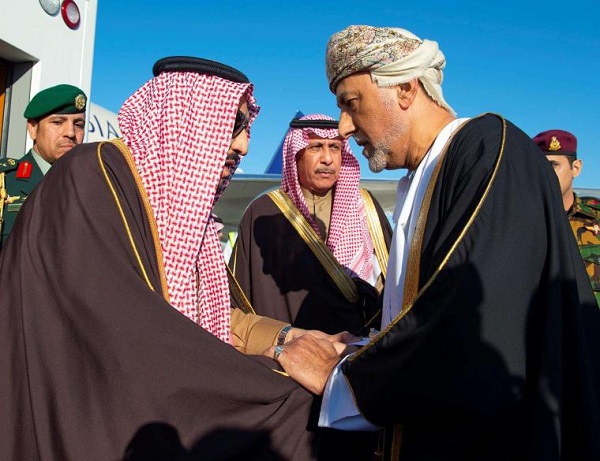Alwaght- Oman’s royal court on Saturday announced the death of long-serving Sultan Qaboos bin Said al Said. Only hours later, it announced the royal council’s decision to appoint Haitham bin Tariq Al Said as his successor on the late sultan’s written recommendation.
Sultan Qaboos ruled the country for half a century with a peaceful policy based on creating a balance in relations with various regional and international powers. But what changes will the country’s policies undergo especially with such regional powers as Saudi Arabia as the most important Arab world actor?
Saudi-Omani relations under Sultan Qaboos
To have a good understanding of the Saudi-Omani ties it should be taken into account that the Sultanate of Oman is somehow isolated religiously and geographically, despite having land borders with Saudi Arabia, the UAE, and Yemen. The geographical status makes Oman isolated as it has border disputes with the UAE and Saudi Arabia who set greedy eyes on its territories. This pushes Muscat to seek to garner the support of actors from outside the Arabian Peninsula.
Over 50 years of Qaboos rule, Oman tried to maintain friendly relations with Iran in a bid to create a balance between Tehran and Riyadh for the good of its security conditions, as it besides cooperated with the US to keep away possible threats.
Oman’s majority and official faith is Ibadi Islam. Wahhabism, which rules Saudi Arabia ideologically, excommunicates the Omani faith. So, clearly, the geographical and religious factors significantly influence Saudi-Omani relations, mainly when it comes to security.
At the same time, the root problems of the ruling Omani family with the Al Nahyan as the strongest royal family in the UAE should not be ignored. This issue highlights Oman’s geographical restriction.
Oman has always been in work with Iran to contain Saudi risky policies, while at the same time pursues joint work with Saudi Arabia where they have common interests. This policy puts Oman under unceasing pressures from other Persian Gulf Arab states, particularly Saudi Arabia, which wants it to change policy and be more compliant with them. Under Qaboos Oman tried hard to avoid yielding to the Arab decisions and prescriptions.
Why Riyadh pressed Oman under Qaboos
To realize their regional policies, the Saudi rulers repeatedly put strains on Qaboos’s Oman. The main areas where the two sides’ views clash were Iran, Qatar, and Yemen cases.
Riyadh pressed Muscat to stop trade ties with Iran so that the Islamic Republic would change its regional behavior and policy under the duress of the American sanctions. Oman repeatedly rejected these Saudi calls, adopting an independent policy with regard to its security and political considerations in defiance of the Arab kingdom. During a visit of Omani Foreign Minister Yusuf bin Alawi to Tehran last month, Tehran and Muscat expressed intention to expand trade exchange and said that in the future the Omani ports will be key hosts for Iran’s regional and international trade.
In Qatar case, Saudi Arabia several times asked Oman to join the anti-Doha blockade by severing ties with the small emirate.
Since the beginning of the Yemen crisis, the Saudis called on Oman to cut ties with Ansarullah movement (Houthis) and join the Saudi-led Arab military coalition in Yemen. But until his death, Qaboos kept his contacts with the Ansarullah and even hosted them in Muscat as part of broader mediation efforts.
Riyadh has always attempted to change Muscat’s regional policies to shift it from a mediator to a follower of the Saudi policies. But Oman smartly resisted the Saudi pressures and even took longer steps towards expanding its regional role by pushing aside Riyadh from the Israeli-Palestinian equations through establishing diplomatic relations with Tel Aviv.
Saudi pressure tools against Oman
Over the past years, Saudi Arabia showed it takes steps towards undermining the Omani role in the region. It tries to persuade the US that Oman is a very weak actor in the American regional strategy. Riyadh struggles to persuade Washington that Muscat plays a role in Iran’s bypass of the economic sanctions and so it needs to be removed from the US’s Iran policies so that Riyadh can easily dictate its policies to the sultanate.
The Saudi investments in Oman, including a $250 million investment fund in Duqm central-eastern Oman, work as pressure instruments in the hands of Riyadh against Muscat.
All in all, under Qaboos, the Saudi rulers always did their best to prevent Oman from being an active and balancing mediator and actor. They did so using a series of strains to bring Muscat into the Riyadh-Abu Dhabi-Manama alliance. The efforts proved a failure as the trio’s policies in more than an areas clash with those of Oman.
Riyadh-Muscat relations outlook under the new sultan
When Oman announced the death of its leader, Qatar, Kuwait, the UAE, Bahrain, and Egypt declared three-day mourning but Saudi Arabia declined to declare so.
Still, Riyadh joined the inauguration of the new sultan at the highest level, indicating that Oman remains a significant player in the eyes of the Saudis. In fact, with his visit o Muscat, King Salman of Saudi Arabia made it clear that the kingdom wants even warmer ties with the sultanate under the new sultan.
Oman’s specific geographical conditions and regional policies and also the fact that the new sultan has a considerable record of foreign policy experiences taken into account, the future of Riyadh-Muscat relations is given away by Sultan Haitham’s remarks who in his inauguration said that he will continue the late sultan’s foreign policy.



























